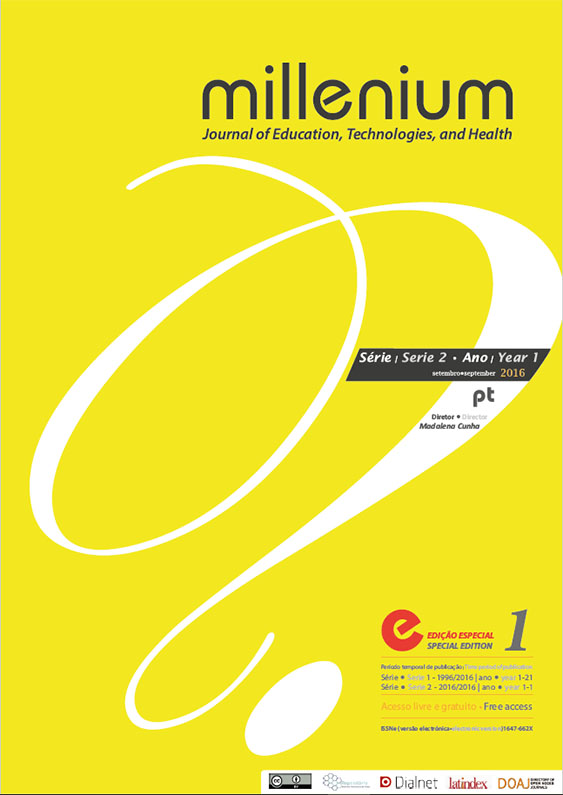Occupational Health of Healthcare Providers: An Organizational Climate Study in Residential Structures for the Elderly
Keywords:
Occupational Health, Residential Structures for Elderly, Organizational Climate, SatisfactionAbstract
Introduction: The increase in life expectancy is one of the greatest human achievements, however, proves to be simultaneously a huge challenge. The increasing number of elderly led to the growth of appropriate social responses, regulated by official quality criteria, the Residential Structures for Elderly (ERPI’s). However, despite the quality criteria regulated, we found few investigations and interventions about organizational climate (OC) at these institutions and the practice of its assessment is not yet widespread.
Objective: analyze the OC in five ERPI’s.
Methods: 108 workers participated in the study, mostly women (73%), with an average age of 39.76 (± 10.57) and with permanent employment contract (88%). The instrument was built specifically for this study and included 50 items organized on ten dimensions.
Results: showed that although in general the OC perception could be considered moderately satisfactory, workers reported high levels of dissatisfaction about pressure on the musculoskeletal system and with reward system. Some socio-demographic and professional variables were significant in OC, particularly in stress levels, that nonetheless proved to be low.
Conclusions: the results pointing strategies to organizational intervention in the five ERPI’s and discuss future research in OC assessment in these structures.
Downloads
References
Almeida, A. J. P. S. (2008). A pessoa idosa institucionalizada em lares: Aspectos e contextos da qualidade de vida (Dissertação de mestrado, Universidade do Porto). Acedido em https://repositorio-aberto.up.pt/handle/10216/7218?locale=pt
Araújo, P., & Jordão, F. (2011). The unemployable: Case studies on the psychosocial impacts of non-employment among Portuguese graduates. Análise Psicológica, 29(2), 289-314. doi: http://dx.doi.org/10.14417/ap.54
Daniel, F. (2009). Profissionalização e qualificação da resposta social ‘Lar de Idosos’ em Portugal. Interacções, 17, 65-74.
Fernandes, R. I. R. S. (2013). Bem-estar subjetivo e (des)emprego: Um estudo sobre o ajustamento pessoa-ambiente profissional (Tese de doutoramento, Universidade de Coimbra). Acedido em https://estudogeral.sib.uc.pt/handle/10316/21653
Fernandes, R., Martins, E., Mendes, F., & Xavier, P. (2011). Satisfação com o trabalho em educadores sociais e professores. In A. Lozano, M. Uzquiano, A. Rioboo, J. Blanco, B. Silva, & L. Almeida (Eds.), XI Congreso Internacional Galego-Portugués de Psicopedagoxía (pp. 2741-2752). Coruña, Spain: Revista Galego-Portuguesa de Psicoloxía e Educación.
Human Resources Survey. (2014). What is an employee climate survey? Acedido em http://www.hr-survey.com/EmployeeClimate.htm
Portugal, Instituto Segurança Social. (2014). Modelo de avaliação da qualidade em estruturas residenciais para idosos. Lisboa: ISS. Acedido em http://www.seg-social.pt/documents/10152/13645/gqrs_lar_estrutura_residencial_idosos_modelo_avalia%C3%A7%C3%A3o/41b4bfa9-a62d-4bb4-b368-c79d60211ecd
Lima, S., & Albano, A. (2002). Um estudo sobre clima e cultura organizacional na concepção de diferentes autores. Revista CCEI: Centro de Ciências da Economia e Informática, 6(10), 33-40. Acedido em http://nti.facape.br/ruth/adm-comport_organ/Conceito_de_cultura_e_clima_organizacional.pdf
Martins, M., Oliveira, B., Silva, C., Pereira, K., & Sousa, M. (2004). Construção e validação de uma escala de medida organizacional. Revista Psicologia Organizações e Trabalho, 4(1), 37-60.
Mello, M. (2004). A qualidade do clima organizacional como variável interveniente no desempenho humano no trabalho: Um estudo de caso da empresa Herbarium (Dissertação de Mestrado, Universidade Federal de Santa Catarina, Brasil. Acedido em https://repositorio.ufsc.br/handle/123456789/88130
Menezes, I., Sampaio, L., Gomes, A., Teixeira, F., & Santos, P. (2009). Escala de clima organizacional para organizações de saúde: Desenvolvimento e estrutura fatorial. Estudos de Psicologia, 26(3), 305-316. doi: http://dx.doi.org/10.1590/S0103-166X2009000300004
Despacho Normativo n.º 12/98. (1998, Fevereiro 25). Estabelece as normas reguladoras das condições de instalação e funcionamento dos lares para idosos. Diário da República, 1(47), pp. 766-744. Acedido em https://dre.pt/application/file/211293
Portaria nº 67/2012. (2012, Março, 21). Define as condições de organização, funcionamento e instalação das estruturas residenciais para pessoas idosas. Diário da República, 1(58), pp. 1324-1329. Acedido em https://dre.pt/application/file/553791
Pordata. (2014). População residente segundo os censos: Total e por grandes grupos etários. Lisboa: Fundação Francisco Manuel dos Santos.
Quick, J., & Tetrick, L. (2003). Prevention at work: Public health in occupational settings. In Handbook of occupational health psychology (pp. 3-17). Washington, DC: American Psychological Association. doi:http://dx.doi.org/10.1037/10474-000
Silva, K. (2007). Cultura e clima organizacional: Manual de pós graduação. Brasilia: Universidade Gama Filho.
Zohar, D. (2003). Safety climate: Conceptual and measurement issues. In J. C. Quick, & L. E. Tetrick (Eds.), Handbook of occupational health psychology (pp. 123-142). Washington, DC: American Psychological Association. doi: http://dx.doi.org/10.1037/10474-006
Downloads
How to Cite
Issue
Section
License
Authors who submit proposals for this journal agree to the following terms:
a) Articles are published under the Licença Creative Commons (CC BY 4.0), in full open-access, without any cost or fees of any kind to the author or the reader;
b) The authors retain copyright and grant the journal right of first publication, allowing the free sharing of work, provided it is correctly attributed the authorship and initial publication in this journal;
c) The authors are permitted to take on additional contracts separately for non-exclusive distribution of the version of the work published in this journal (eg, post it to an institutional repository or as a book), with an acknowledgment of its initial publication in this journal;
d) Authors are permitted and encouraged to publish and distribute their work online (eg, in institutional repositories or on their website) as it can lead to productive exchanges, as well as increase the impact and citation of published work
Documents required for submission
Article template (Editable format)





